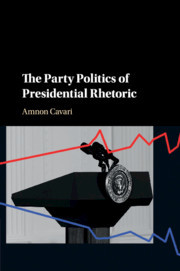Description
The Party Politics of Presidential Rhetoric
Author: Cavari Amnon
This book develops a theory of presidential public leadership taking into account the partisan nature of the political debate and the role of presidents.
Language: English
Subject for The Party Politics of Presidential Rhetoric:
Approximative price 25.06 €
In Print (Delivery period: 14 days).
Add to cart
The Party Politics of Presidential Rhetoric
Publication date: 08-2018
Support: Print on demand
Publication date: 08-2018
Support: Print on demand
Approximative price 112.79 €
In Print (Delivery period: 14 days).
Add to cart
The Party Politics of Presidential Rhetoric
Publication date: 03-2017
246 p. · 15.7x23.5 cm · Hardback
Publication date: 03-2017
246 p. · 15.7x23.5 cm · Hardback
Description
/li>Contents
/li>Biography
/li>
By bringing together two bodies of literature - the presidency and political parties - this book makes two important contributions. First, it addresses the gap between presidential public actions and the perceived limited effect they have on public opinion. By examining the short-term effect of speeches of presidents on the entire public, the long-term effect of the speeches on their partisans, and on the reputations of their parties for handling policy, the book shows that presidents are effective leaders of public opinion. Second, the book adds to the scholarly interest in how political parties are viewed by the electorate in terms of policy substance. It suggests that Americans possess coherent reputations of the parties for handling policy challenges, and that these reputations contribute to the party identifications of Americans. The effect of presidents on the reputations and, in turn, party attachments position them as leaders of the party system.
1. Presidents, public opinion, and the political parties; 2. Assessing presidential communications; 3. The effect of presidential rhetoric on the attentive audience; 4. The short-term effect of presidential rhetoric; 5. Presidential leadership of partisan opinion; 6. The public agenda and the reputations of the parties for handling policy; 7. Presidential rhetoric and the public agenda; 8. Presidential rhetoric and party reputations for handling policy; 9. The interplay of macrohandling and macropartisanship; 10. The party politics of presidential rhetoric.
Amnon Cavari is Assistant Professor of government at the Interdisciplinary Center (IDC) Herzliya, Israel, and is the founder and head of the American Public Opinion toward Israel project at the IDC.
© 2024 LAVOISIER S.A.S.




